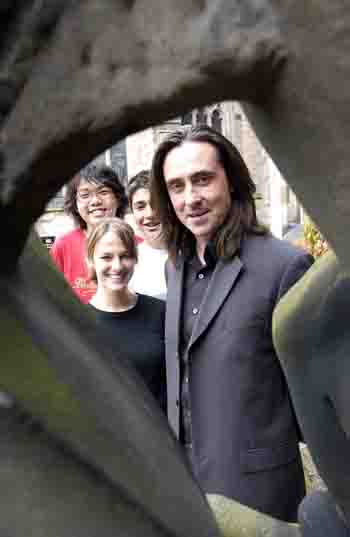A unique four-year degree programme which explores current major world problems is being launched at the University of Aberdeen today (Wednesday, June 27) by Neil Oliver of the BBC’s Coast programme.
The focus of the Global Challenges degree course is the science that surrounds global environmental change and the causes, effects and societal and political consequences that surround it. This is the first course of its kind to be launched by a UK university.
The launch will be marked with an event for nearly 200 Sixth Year pupils from seven local schools. A further 34 school pupils aged 16 and 17 from across the UK and Europe will also be joining the launch from the Headstart programme (a Summer School run by the College of Physical Sciences as part of a national scheme run by Headstart, which is linked to the Engineering Development Trust and endorsed by the Royal Academy of Engineering). The theme for the Headstart week is Science and Society, focussing on Energy.
Professor C Duncan Rice, Principal of the University of Aberdeen, will provide a welcome to the schoolchildren attending, which will be followed by a Global Challenges presentation by Gordon Walkden, Professor in Geology and Petroleum Geology and Director of Teaching and Learning.
Neil Oliver will deliver the guest lecture and will host a Q&A session with the schoolchildren.

Ahead of the launch, Professor Walkden said: "I am delighted that Neil Oliver has agreed to give the guest lecture at the launch of the Global Challenges degree programme which is being held at the University of Aberdeen. I am sure he will excite the school children with science and be sharing his television experiences with them.
"Global Challenges is a new type of degree that explores complex, interconnected global issues rather than requiring the increased specialisation that is a feature of many existing science and technology degrees. These include climate change, natural disasters, natural resources, pollution, energy, international politics and population change.
"These students will be encouraged to think broadly, but they will be given the opportunity to explore areas of science and technology in-depth where it is relevant and appropriate.
"Nonetheless, graduates of the programme will emerge as integrators, problem solvers, and communicators rather than as technical specialists. Their potential areas of employment will be in environmental research, business, commerce, politics and the media."
The programme will immerse students from the outset in how people with different expertise in Science, Technology, Arts and Medicine have different perspectives on the same sets of problems. Examples of subjects include climate change, sea level rise, global populations, the energy crisis, famine and biotechnology.
In later years, the students will take courses across the University in a broad-based curriculum intended to develop knowledge and understanding in both science and social science. Core material will focus on enhancing skills in the integration and communication of complex scientific, societal and political issues. Problem-based approaches will encourage integrative thinking and research skills, whilst new courses in communication will encourage flexibility of style for different audiences, from writing technical scientific articles to creating more general and accessible materials for public media and journalism. Students will create their own Global Environmental Change website that will become an educational resource in its own right.
Professor Walken added: "We examine the relationships between science, society and the environment in order to understand and help solve the global challenges that face us. Science, and its proper understanding, is essential to our way of life, and sustainable solutions are the key to our long term success.
"This programme offers much flexibility and will appeal to students with a good general or science background. To that end, we'll be hosting a Global Challenges Question Time event at the University's annual Open Day on August 28 in King's College Centre for anyone who wants to find out more. It will explore questions about issues such as global warming, pollution and third world poverty and there will also be an opportunity to learn more about the Global Challenges degree programme."


